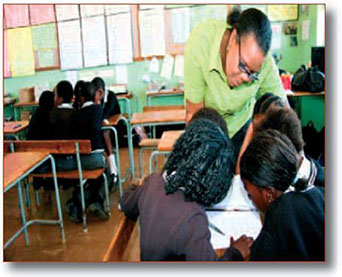4 How can you teach using the TESSA materials?
The TESSA materials promote interaction and offer ideas for innovative teaching in your classroom to help your pupils’ learning.
Once you have selected and adapted the appropriate TESSA materials, concentrate on the following:
- planning your lesson
- teaching methods
- classroom management
- time management
- assessing pupils’ learning
- thinking about and improving your teaching
Planning is a continual process that helps you to think and prepare what is needed to help your pupils respond well to you and the content of what you teach.
TESSA Snapshot: Planning a lesson using TESSA materials
|
Mavis Ngini, a teacher in South Africa, was preparing a lesson where her pupils were going to create anti-litter posters based on a TESSA activity. In the previous lesson Mavis’ pupils had already assessed the level of litter on the school grounds and in the next lesson they will collect and categorise the litter for recycling or proper disposal. For her lesson today on creating posters, Mavis has to think through how much time the activity will take, what resources she will use, whether she will need any additional support, and how she will manage her class. |
For your pupils to learn from your lessons they need to be:
- interested – if they are not, nothing of any value will take place
- very clear about what you want them to do and achieve.
For further information on planning and preparing your lesson plans, go to the TESSA Key Resources [Tip: hold Ctrl and click a link to open it in a new tab. (Hide tip)] in your country area of the website.
Things to think about and do before the lesson starts
- A TESSA activity can take place across more than one lesson period.
- Some lessons can take place outside the classroom, but you need to have an alternative plan should the weather change.
- It’s important to ensure you have all the resources you need at hand before the lesson starts.
- Organise your classroom to suit the activity.
- If you are using technology, have you tested that it still works?
- Before you carry out an experiment, you may want to try it yourself or with your colleagues so that you are confident when trying it out with your pupils.
The TESSA materials promote activity-based learning, however, as a teacher you need to remain involved throughout the lesson, even when your pupils are engaged in group work. For more information on using group work in your classroom, go to the Key Resources.

Do not panic if something in your lesson does not go according to plan. Wherever possible, during your lesson planning, create alternative activities to ensure the success of your lesson.
Things to think about and do during and after the lesson
- If you involve people from outside the school in your lessons, ensure you have an alternative plan should they not turn up.
- Ensure that your alternative plan fits in with the classroom arrangements already made.
- Should something unexpected happen just before or during the lesson:
- acknowledge the problem.
- involve the pupils in solving the problem.
- identify parts of the lesson plan that can still take place.
- Ensure that you follow up on any promises made to the class.
TESSA Snapshot: Facilitating small group work
|
Mr Obafemi Adamu, a teacher in Nigeria, divided his pupils into groups to design some posters. During this activity, Mr Adamu facilitates learning by moving around amongst the groups to answer questions, give guidance, encourage problem solving, ensure full pupil participation, and give praise, etc. |
 |
3 How can you adapt TESSA materials to use in your lesson plans?



